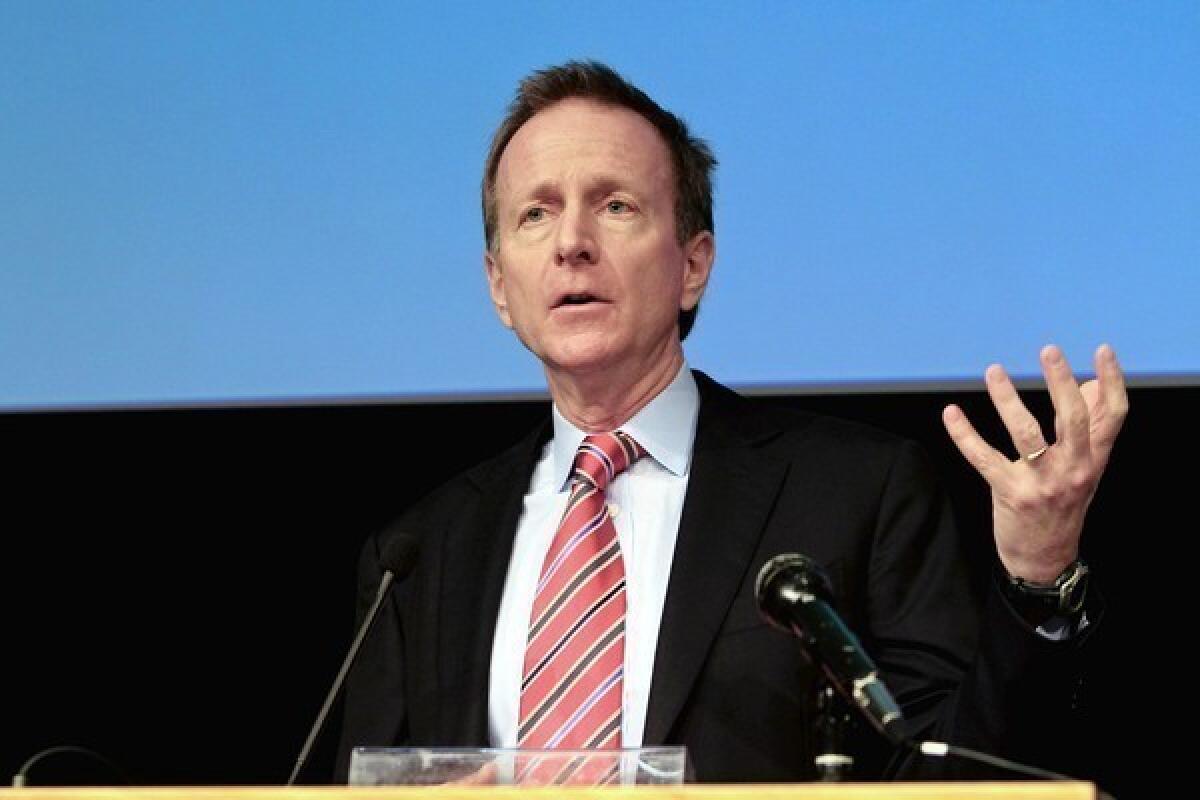Politics lights a fire under LAFD

- Share via
A Los Angeles mayoral candidate took an early campaign swipe at his leading opponents this week and inadvertently exposed the city Fire Department for publishing misleading performance data.
Top brass at the Los Angeles Fire Department on Friday admitted that for years the agency put out data that made it appear that firefighters were arriving at the scene of emergencies faster than they actually were.
The dust-up began Thursday, when candidate Austin Beutner complained in an online Huffington Post column that recent Fire Department budget cuts have sent response times for medical emergencies soaring. Beutner laid the blame on the City Council members who approved the cuts, singling out mayoral rivals Eric Garcetti and Jan Perry. He also criticized another opponent, City Controller Wendy Greuel, for failing to scrutinize the impact of the cuts.
Relying on Fire Department reports presented to lawmakers, Beutner said that in 2008 the department responded to medical emergencies within five minutes 86% of the time. After the cuts, the department last year met that standard just 59% of the time, he said.
After Beutner’s critique -- and a Times inquiry -- the department made an awkward admission: Data showing it did so well in the past was simply wrong.
Federal guidelines call for first responders to arrive on scene in under five minutes 90% of the time. But a former department statistician counted all responses within six minutes, officials explained, which improved the record. Retired Captain Billy Wells, who crunched the data with a hand calculator, said he followed the department’s long tradition of using a six-minute response standard.
Wells’ successor, Capt. Mark Woolf, said he reluctantly continued using the flawed formula for a time because he didn’t want to be blamed for a sudden drop in department performance. “I didn’t want to touch that [extra] minute because I knew the data would take a dump,” he said.
Corrected data generated by a new computer system show that in 2008, the department actually hit the five-minute goal only 64% of the time, officials said. By last year, that number had fallen to about 60%.
The statistics snafu comes as the department is facing increased scrutiny over how budget reductions have affected service.
Fire Chief Brian Cummings said his department’s performance is pretty good, given the 16% reduction to its budget in recent years, which has led to the elimination of fire trucks or ambulances at about one-fourth of the city’s 106 fire stations. The average response time citywide has increased only several seconds, he said. “I need the public to be reassured that we’re going to get there and get there in a timely matter,” Cummings said.
Others disagree. The head of the firefighters union has complained that his members are being run ragged. And he says there has been a rise in “collisions,” when units struggle to respond to simultaneous emergencies in the same station area. That’s what happened in January, when a man trapped inside a burning house in the San Fernando Valley suffered severe burns after it took firefighters nine minutes to arrive on scene, said Pat McOsker, the president of United Firefighters of Los Angeles. A fire truck from the nearest station was on another call, he said, and the backup truck had been eliminated because of the cutbacks.
McOsker says a promise from the fire chief to shift some trucks and ambulances around the city next month isn’t enough. “The way to solve this problem is to reopen resources, not to reshuffle the deck,” he said. “We’re not giving people the best chance to survive these things.”
He also pointed to problems with aging dispatch equipment that has been malfunctioning. Officials say they’ve been forced to rely on a backup system. The department recently opened a new bond-financed dispatch center, but hasn’t had the money to upgrade its equipment.
While Beutner criticized the service reductions in his recent column, he failed to mention Mayor Antonio Villaraigosa, who prepares the city budget and who called for Fire Department cuts. Beutner was Villaraigosa’s “jobs czar” in 2010, the year before the mayor said the department must make cuts that analysts said would save the city nearly $200 million.
“This was the mayor’s office’s plan and Beutner was first deputy mayor when it was created,” said Yusef Robb, a spokesman for Garcetti, the main target of Beutner’s attack. He said Garcetti helped save 318 staff positions in the Fire Department that the mayor sought to permanently eliminate.
Councilman Mitchell Englander, who joined the council after the cuts, said the department has been “decimated” in recent years and needs more money. He said he is working with the department to focus on collecting more accurate and useful data.
--
kate.linthicum@latimes.com
Times Staff Writer Ben Welsh contributed to this story.
More to Read
Sign up for Essential California
The most important California stories and recommendations in your inbox every morning.
You may occasionally receive promotional content from the Los Angeles Times.











